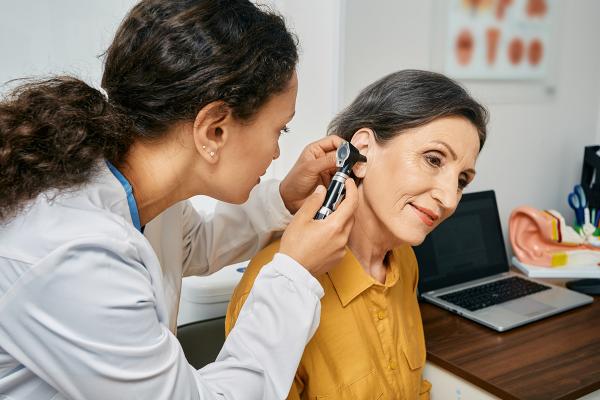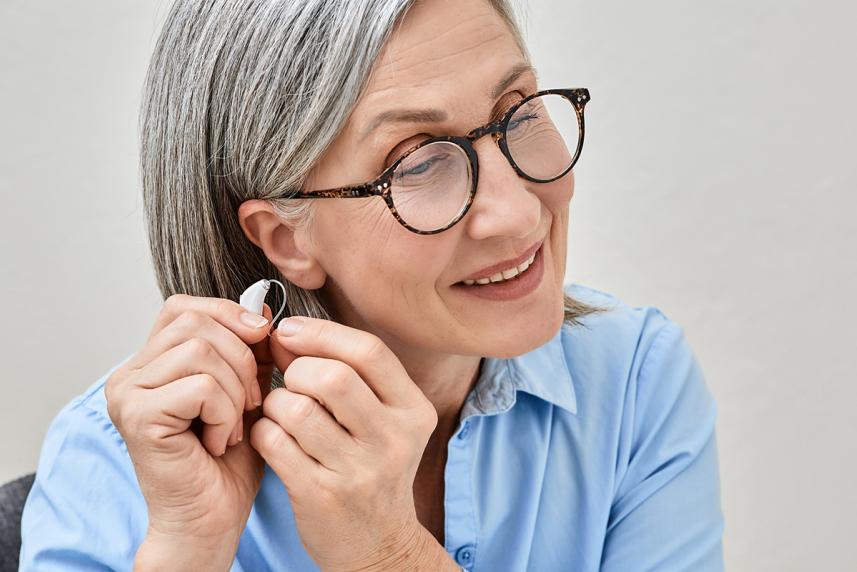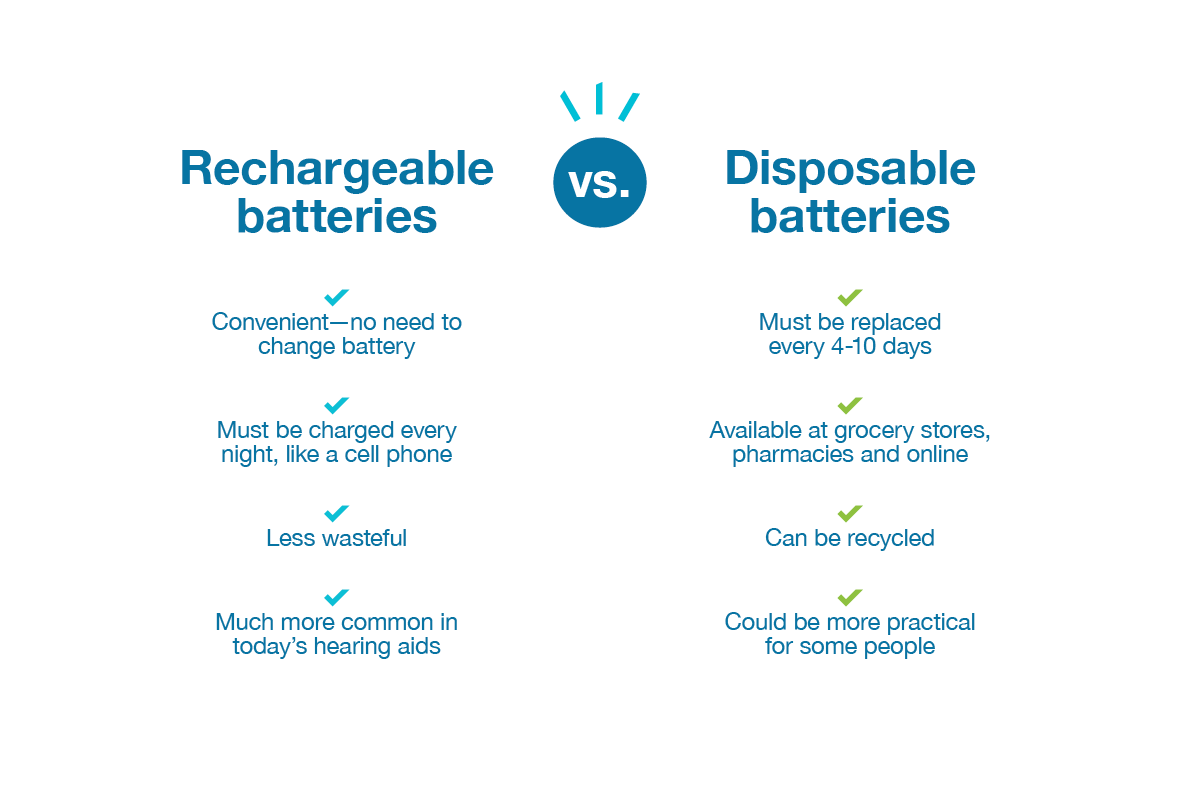
EPIC Hearing Healthcare helps members access hearing exams, hearing aids and more. Sign in to learn more and check eligibility.
No matter which type of battery your devices use, keep them charged and working well with this guide.

There’s no doubt that wearing hearing aids may help you hear more clearly. These devices are tiny sound systems. They work by magnifying the sounds that enter your ear to help you hear better.1
But even the highest-tech devices are only useful if they’re ready to go when you are. And that means the batteries need to be in working order.
This is true whether your hearing aid needs rechargeable or disposable batteries. Or whether you wear prescription or over-the-counter (OTC) hearing aids.
No matter which type of hearing aid you wear, you need the batteries to power up easily and without a hassle. How do you make this happen? Well, first, talk to your hearing care professional, who can help you understand your options. Then read on for answers to some common battery-related questions.

EPIC Hearing Healthcare helps members access hearing exams, hearing aids and more. Sign in to learn more and check eligibility.
Yes. You typically have a choice between two types: rechargeable and disposable. “Hearing aids powered by rechargeable batteries have become the most common options in recent years,” says Mary C. Henry, Au.D. She’s an audiologist at Swedish Health Service in Seattle.
Rechargeable batteries may cost a bit more. But wearers often find they are worth it. They’re more convenient than tiny disposable batteries. That’s because you don’t have to change the batteries regularly. Rechargeables are also less wasteful, notes Henry. Plus, they’re more water-resistant because there’s no battery door.2
Still, some people may find hearing aids with disposable batteries more practical for them. To be sure, talk to your hearing care professional. Mention your daily habits and lifestyle. They can discuss your choices and help you pick the right type of hearing aid and batteries.
“Rechargeable hearing aids generally require nightly charging, like a cell phone,” Henry says. The battery life is commonly about 16 hours, but some can stay charged for as many as 30 hours.2
Also check your hearing care plan. If you’re an EPIC Hearing Healthcare member, for instance, you get a charger at no extra cost if you buy rechargeable hearing aids.
How long the battery keeps its charge depends on different factors, though. The battery will drain more quickly if you stream music or phone calls to your device, for example. Very hot or cold temperatures might also affect battery life.2
Disposable batteries need to be replaced fairly often. You’ll typically have to change them every 4 to 7 days, says Henry. But that depends on how many hours a day you wear your hearing aids. And how big the batteries are. Some larger batteries may last 10 days.3
If you find your batteries lasting fewer than 3 days, try cleaning both the battery and the door with a dry cotton swab.

It happens. But there is usually a fix. Most rechargeable hearing aids can fully charge in 3 or 4 hours, says Henry. You can tell if the light on the charger stops flashing or turns a different color.2
“You can also charge them for less time – 30 to 60 minutes – and still get a few hours of battery life,” says Henry.
If you use disposable batteries in your hearing aids, the answer is yes. In fact, it’s a good idea to have a few spare batteries on hand because you need to change them out at least weekly, says Henry.
You may buy disposable batteries at grocery stores, pharmacies, gas stations, or online.3 Also check your hearing care plan. With EPIC Hearing Healthcare, you get a 3-year supply of batteries at no extra cost if you buy a hearing aid that uses disposable batteries.
You won’t need spare rechargeable batteries, Henry says. That’s because the batteries are inside the hearing aids and can’t be removed. On rare occasions when rechargeable batteries need replacement, talk to your hearing care professional. They might do some basic troubleshooting or discuss what to do next. They may also help you if you have to return the hearing aids to the manufacturer.
Hearing aid batteries are small. So, they’re sometimes tricky to swap out. Try using a hearing aid brush with a magnet to place the battery into the battery drawer. Or ask a family member or friend to help you with the change.
Then try these other tips to make switching out batteries easier:
You might consider recycling the batteries instead of tossing them into the trash. “Contact your local recycling service to ask if they accept your size battery,” Henry advises.
Rechargeable hearing aids are like cell phones. The batteries won’t work forever. But they may last years before slowing down.
“Rechargeable batteries often last through the warranty period,” Henry says. The warranty period is typically 3 years. Her suggestion: Ask your hearing care professional to send your devices to the manufacturer before your warranty is up for a final service. The company may replace the batteries.
If your batteries are rechargeable:
If the hearing aids are still not working, try checking the wax trap or filter in your hearing aid. It could be clogged with earwax.
Still can’t solve the problem? Call your hearing care professional for advice if you have prescription hearing aids. Have a pair of OTC hearing aids? Call the manufacturer’s customer service line for help.
In either case, if you need a quick walk through on batteries, or anything else about your hearing aids, they should be happy to help.
Through EPIC Hearing Healthcare, you get up to 3 follow-up visits at no extra cost, a trial period to try out your new prescription hearing aids, and a charger for your rechargeable hearing aids or a 3-year supply of disposable batteries. Learn more.
Sources
Information is for educational purposes only and is not a substitute for the advice of a licensed medical provider. Consult your provider prior to making changes to your lifestyle or health care routine.
Hearing aids purchased in the Silver technology level will receive 1 follow-up visit.
Other hearing exam providers are available in the UnitedHealthcare network.